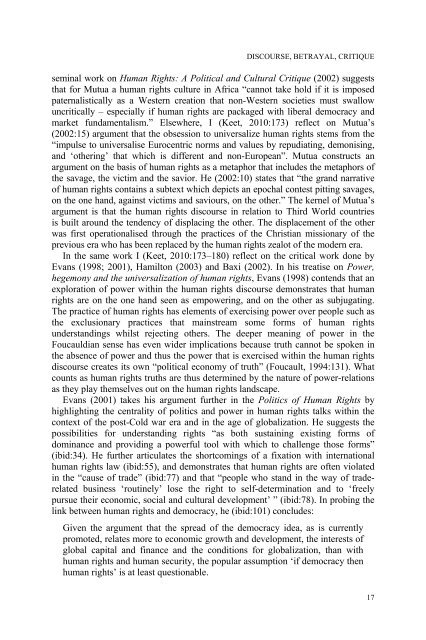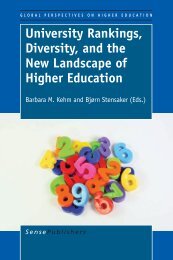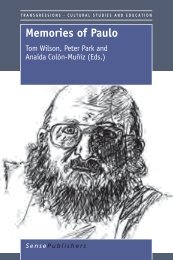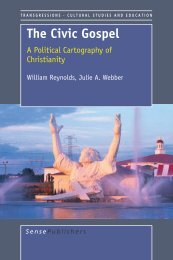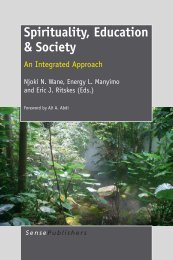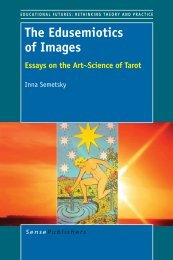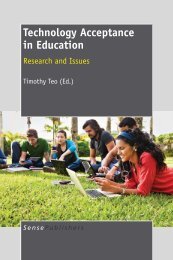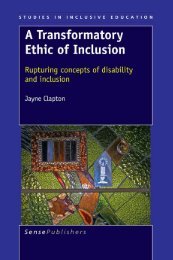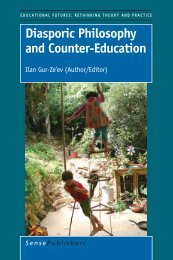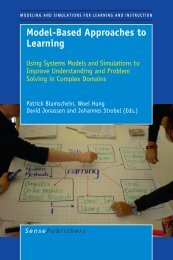Safe Spaces Human Rights Education in Diverse Contexts
Safe Spaces Human Rights Education in Diverse Contexts
Safe Spaces Human Rights Education in Diverse Contexts
You also want an ePaper? Increase the reach of your titles
YUMPU automatically turns print PDFs into web optimized ePapers that Google loves.
DISCOURSE, BETRAYAL, CRITIQUE<br />
sem<strong>in</strong>al work on <strong>Human</strong> <strong>Rights</strong>: A Political and Cultural Critique (2002) suggests<br />
that for Mutua a human rights culture <strong>in</strong> Africa “cannot take hold if it is imposed<br />
paternalistically as a Western creation that non-Western societies must swallow<br />
uncritically – especially if human rights are packaged with liberal democracy and<br />
market fundamentalism.” Elsewhere, I (Keet, 2010:173) reflect on Mutua’s<br />
(2002:15) argument that the obsession to universalize human rights stems from the<br />
“impulse to universalise Eurocentric norms and values by repudiat<strong>in</strong>g, demonis<strong>in</strong>g,<br />
and ‘other<strong>in</strong>g’ that which is different and non-European”. Mutua constructs an<br />
argument on the basis of human rights as a metaphor that <strong>in</strong>cludes the metaphors of<br />
the savage, the victim and the savior. He (2002:10) states that “the grand narrative<br />
of human rights conta<strong>in</strong>s a subtext which depicts an epochal contest pitt<strong>in</strong>g savages,<br />
on the one hand, aga<strong>in</strong>st victims and saviours, on the other.” The kernel of Mutua’s<br />
argument is that the human rights discourse <strong>in</strong> relation to Third World countries<br />
is built around the tendency of displac<strong>in</strong>g the other. The displacement of the other<br />
was first operationalised through the practices of the Christian missionary of the<br />
previous era who has been replaced by the human rights zealot of the modern era.<br />
In the same work I (Keet, 2010:173–180) reflect on the critical work done by<br />
Evans (1998; 2001), Hamilton (2003) and Baxi (2002). In his treatise on Power,<br />
hegemony and the universalization of human rights, Evans (1998) contends that an<br />
exploration of power with<strong>in</strong> the human rights discourse demonstrates that human<br />
rights are on the one hand seen as empower<strong>in</strong>g, and on the other as subjugat<strong>in</strong>g.<br />
The practice of human rights has elements of exercis<strong>in</strong>g power over people such as<br />
the exclusionary practices that ma<strong>in</strong>stream some forms of human rights<br />
understand<strong>in</strong>gs whilst reject<strong>in</strong>g others. The deeper mean<strong>in</strong>g of power <strong>in</strong> the<br />
Foucauldian sense has even wider implications because truth cannot be spoken <strong>in</strong><br />
the absence of power and thus the power that is exercised with<strong>in</strong> the human rights<br />
discourse creates its own “political economy of truth” (Foucault, 1994:131). What<br />
counts as human rights truths are thus determ<strong>in</strong>ed by the nature of power-relations<br />
as they play themselves out on the human rights landscape.<br />
Evans (2001) takes his argument further <strong>in</strong> the Politics of <strong>Human</strong> <strong>Rights</strong> by<br />
highlight<strong>in</strong>g the centrality of politics and power <strong>in</strong> human rights talks with<strong>in</strong> the<br />
context of the post-Cold war era and <strong>in</strong> the age of globalization. He suggests the<br />
possibilities for understand<strong>in</strong>g rights “as both susta<strong>in</strong><strong>in</strong>g exist<strong>in</strong>g forms of<br />
dom<strong>in</strong>ance and provid<strong>in</strong>g a powerful tool with which to challenge those forms”<br />
(ibid:34). He further articulates the shortcom<strong>in</strong>gs of a fixation with <strong>in</strong>ternational<br />
human rights law (ibid:55), and demonstrates that human rights are often violated<br />
<strong>in</strong> the “cause of trade” (ibid:77) and that “people who stand <strong>in</strong> the way of traderelated<br />
bus<strong>in</strong>ess ‘rout<strong>in</strong>ely’ lose the right to self-determ<strong>in</strong>ation and to ‘freely<br />
pursue their economic, social and cultural development’ ” (ibid:78). In prob<strong>in</strong>g the<br />
l<strong>in</strong>k between human rights and democracy, he (ibid:101) concludes:<br />
Given the argument that the spread of the democracy idea, as is currently<br />
promoted, relates more to economic growth and development, the <strong>in</strong>terests of<br />
global capital and f<strong>in</strong>ance and the conditions for globalization, than with<br />
human rights and human security, the popular assumption ‘if democracy then<br />
human rights’ is at least questionable.<br />
17


